This easy recipe for spicy and tangy Schezwan noodles is completely vegan, and delicious to prepare as a tasty lunch or dinner. It features stir fried vegetables and noodles tossed with a homemade Schezwan sauce that’s got a kick of heat and just the right hint of sweetness. Follow my step-by-step instructions with photos and video to make a batch tonight!
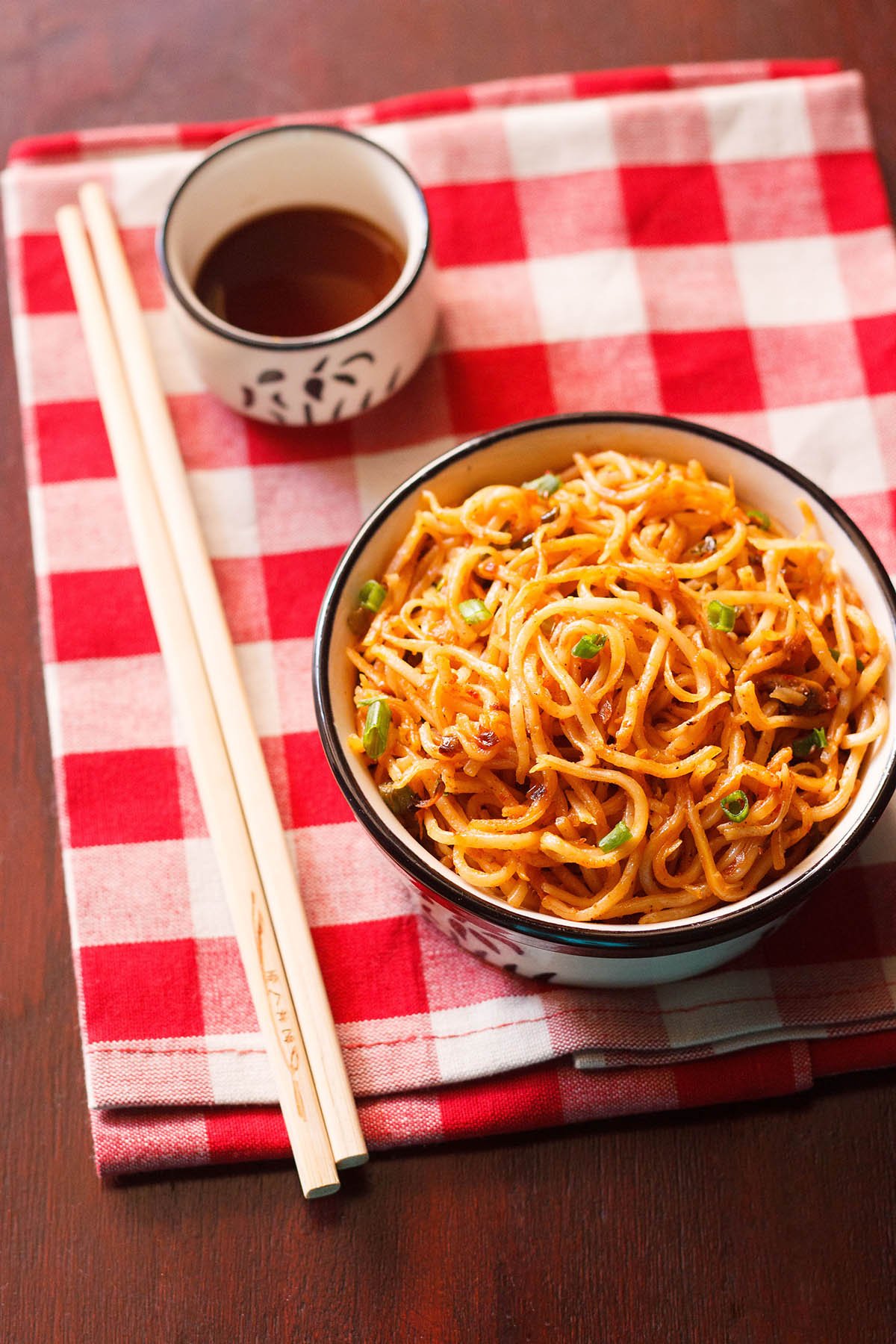
What is Schezwan Noodles made of?
If you haven’t had them before, Schezwan noodles recipe is a very popular Indo Chinese dish. They usually have a mix of bold spicy and sweet flavors, and include either all veggies or both veggies and some kind of protein, stir-fried with the noodles.
Schezwan noodles are often enjoyed as a street food snack, but are super easy and delicious to make at home whenever you have a craving.
The foundation of the recipe is the homemade Schezwan Sauce, which is so amazing on any number of savory dishes.
It adds a yummy sweet and spicy kick as a dip or sauce on fried rice, or with pakoras and veg momos!
Unlike the traditional Chinese sichuan or szechuan noodles that has red chilli oil and is served warm or cold, schezwan noodles is made with schezwan sauce and is served hot.
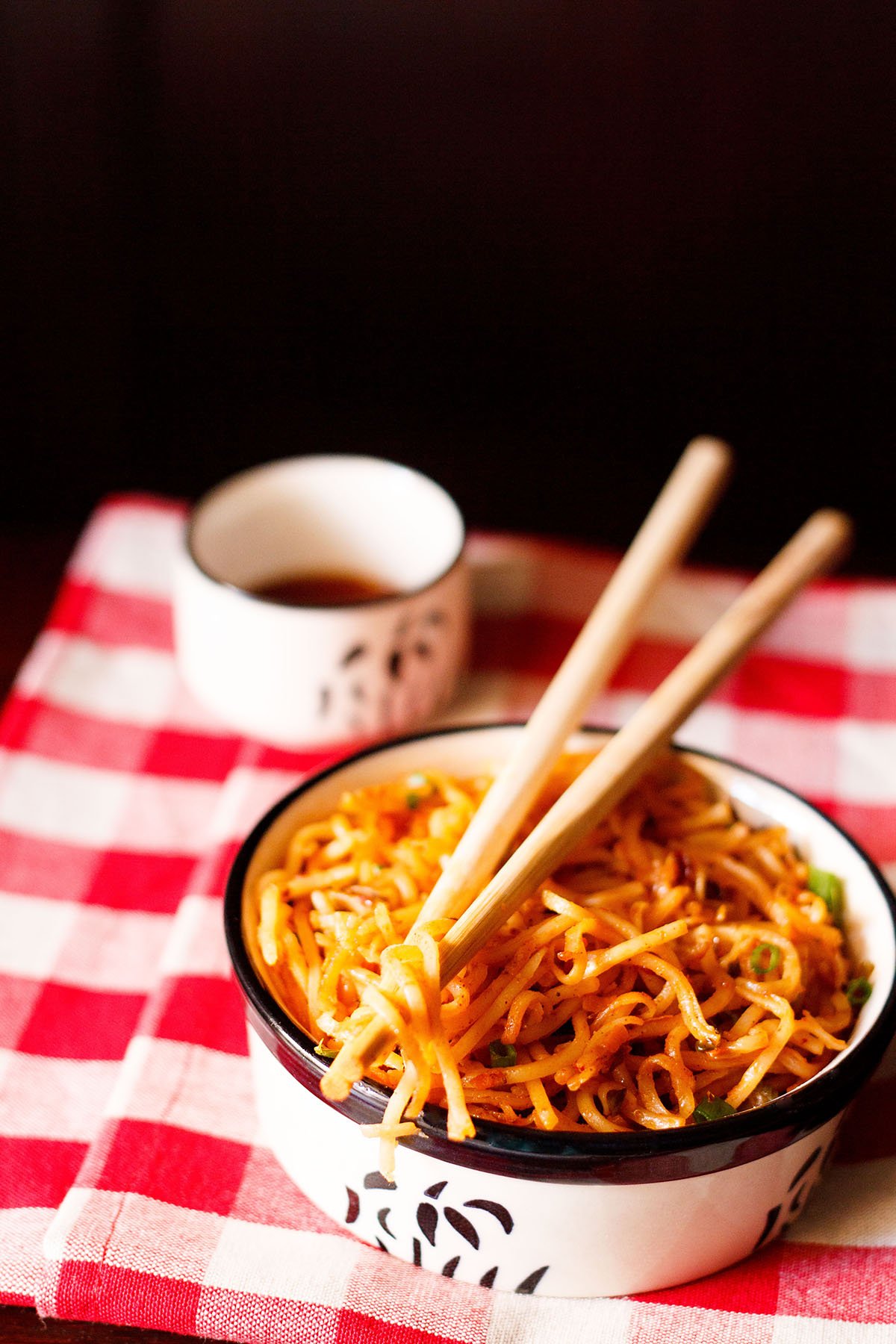
From start to finish this vegetarian and vegan-friendly meal only takes about 40 minutes to make.
It is terrific to enjoy as a quick weeknight dinner or for a leisurely lunch. Once you give this recipe a try I’m sure it will be one of your regular favorites.
Plus, you are going to love using the homemade Schezwan sauce as a dip or topping for all kinds of tasty dishes!
How to make Schezwan Noodles
Cooking the Noodles
1. First, per the noodle package directions, bring the recommended amount of water to a boil in a large pot or pan. Add a pinch of salt for flavor, and a few drops of oil to keep the noodles from sticking together.
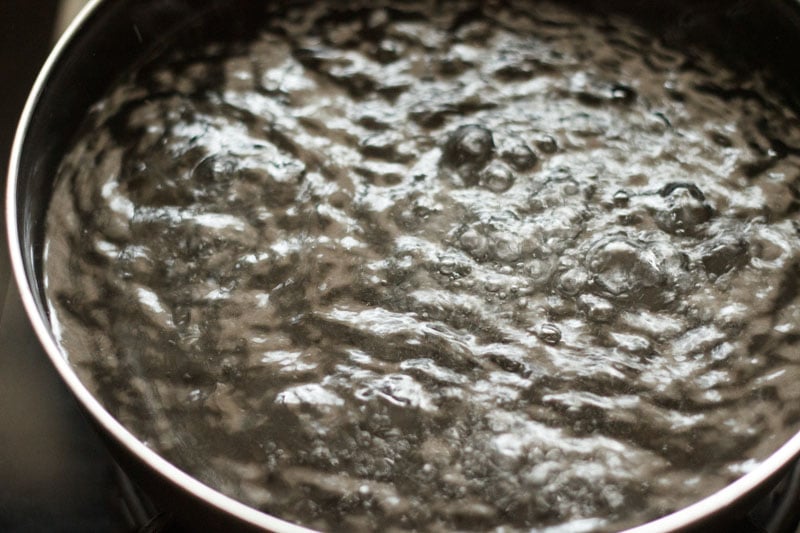
2. Once the water is to a full boil, add the noodles (150 grams). I prefer to use hakka noodles, but any thin rice or wheat flour noodles will work well for this recipe.
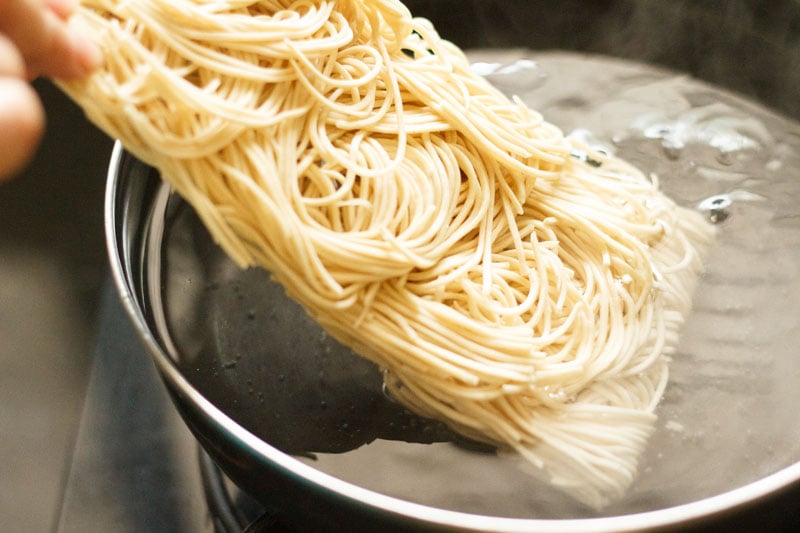
3. There is no need to break the noodles when added to the boiling water. Just be sure they are completely submerged in the water.
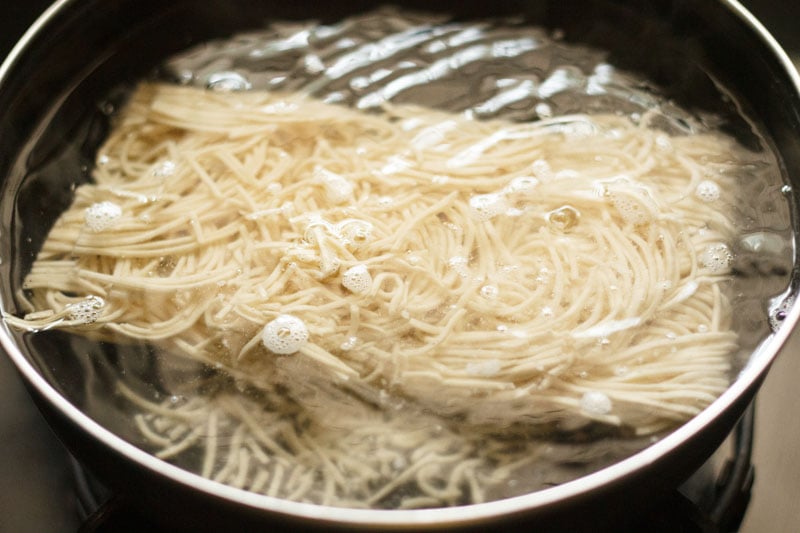
4. Cook the noodles according to the package instructions, stirring occasionally.
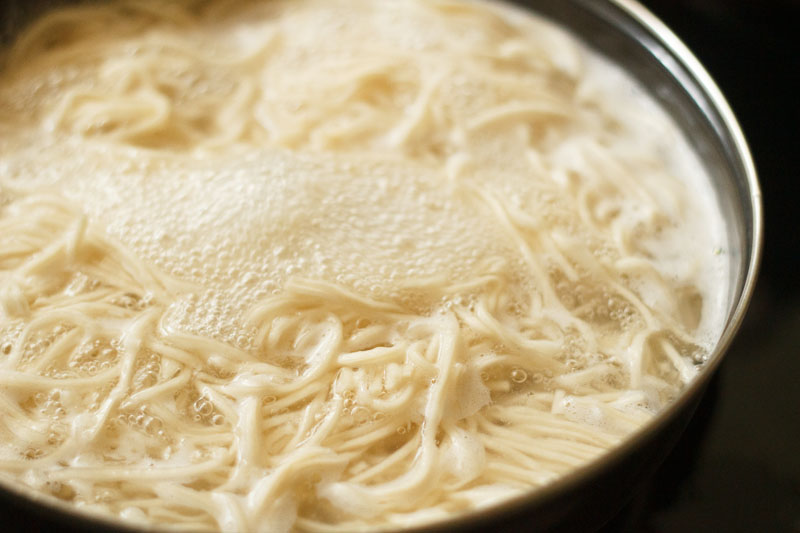
5. Cook the noodles until they are al dente.
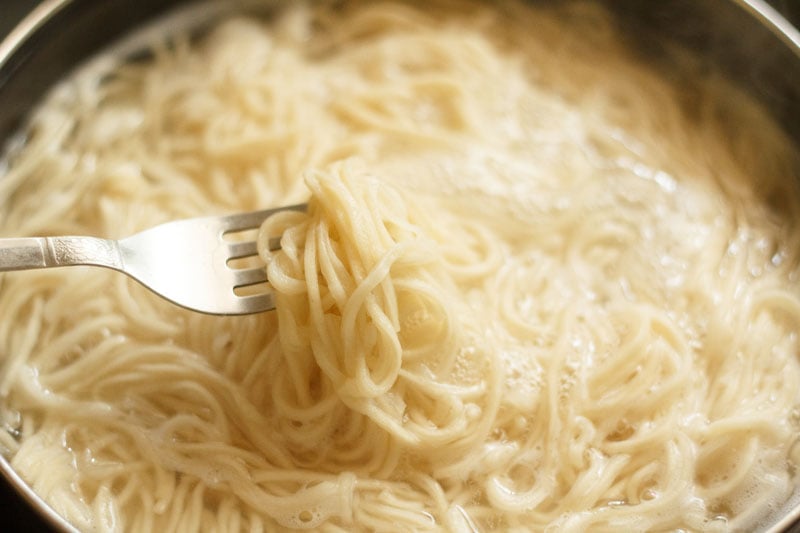
6. Immediately drain the noodles in a colander.
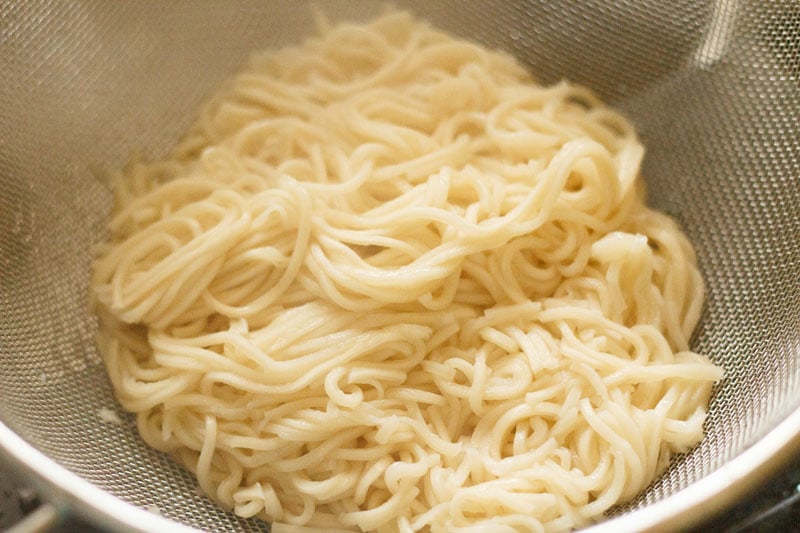
7. Rinse the noodles in cool running water. This step stops the cooking process and removes the sticky starch.
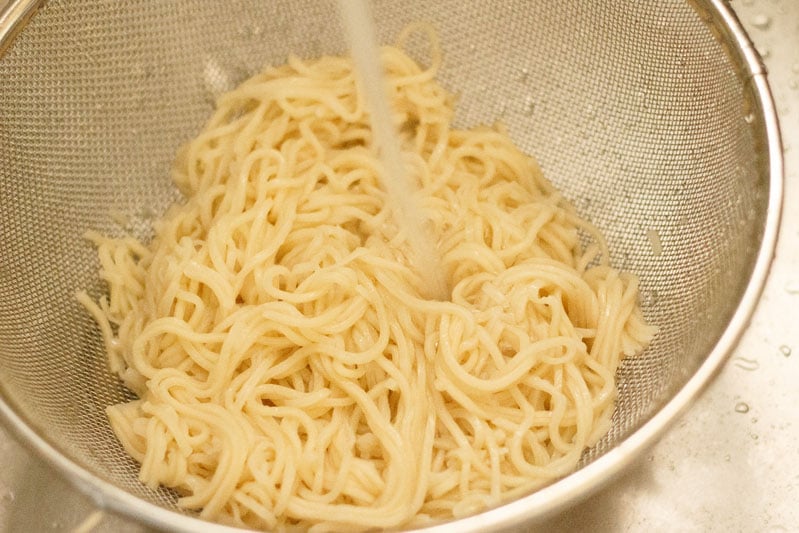
8. While still in the colander, add 1 to 2 teaspoons of oil to noodles. Any neutral oil works or for a smoky flavor, use toasted sesame oil.
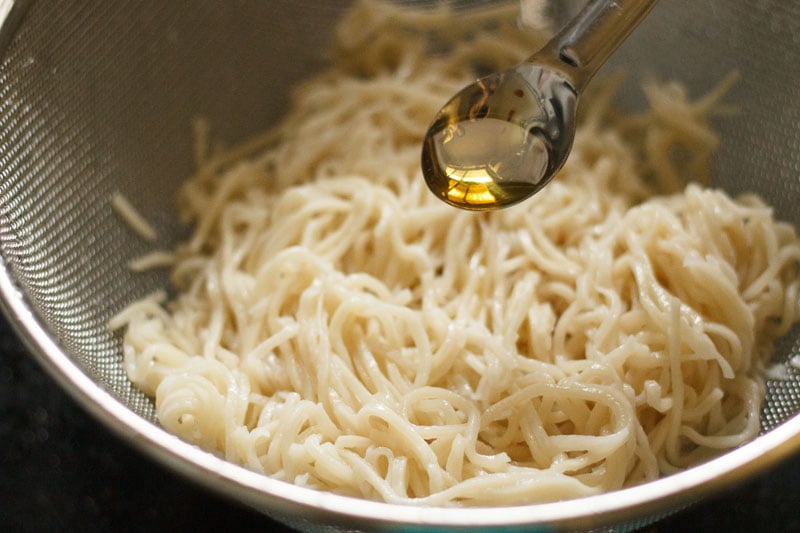
9. Toss the noodles gently, so that the oil evenly coats the noodles. This helps to get rid of stickiness from the noodles. Cover the colander with a plate and set aside. Let the noodles cool completely before you begin making schezwan noodles recipe.
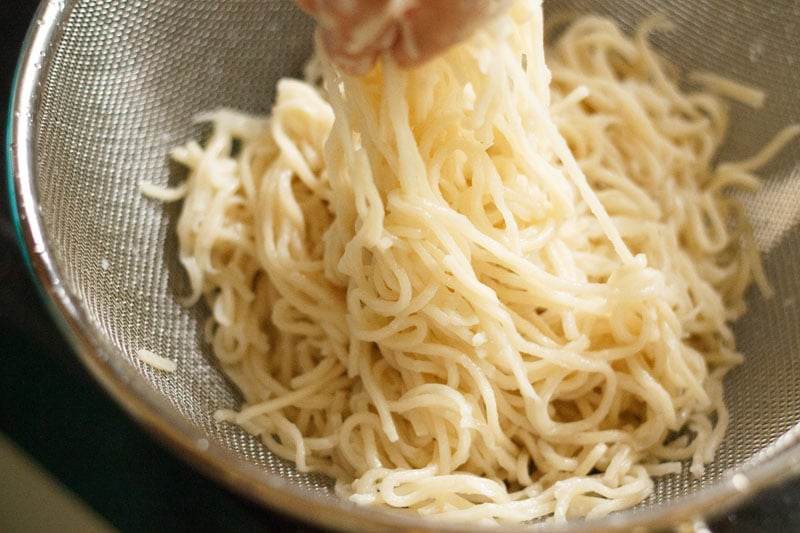
Stir Frying Veggies
10. Next, heat 2 tablespoons of oil (any neutral tasting oil) in a pan or wok on medium heat. A wok or pot with a heavy bottom works best to get great cook on the veggies without burning.
Once the oil is hot add ½ teaspoon of finely chopped garlic and sauté for a few seconds.
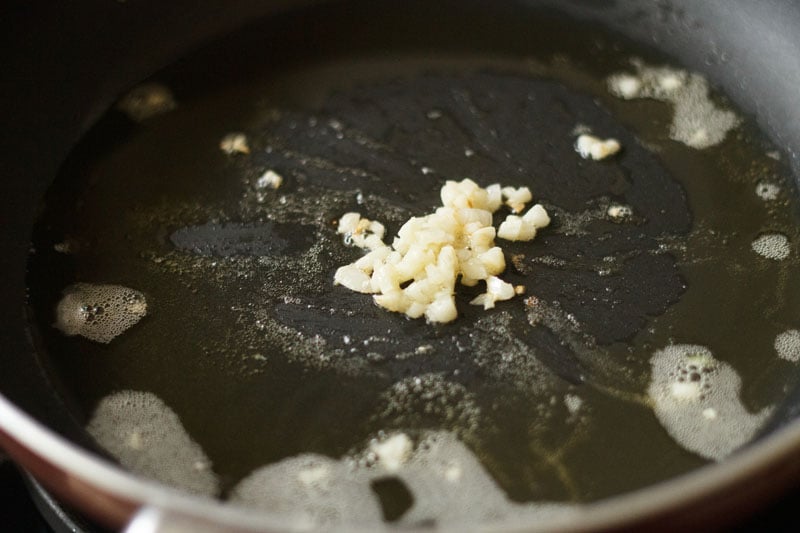
11. When the garlic is fragrant, increase the flame to medium or high heat and add ¼ cup of chopped spring onions (scallion whites). Stir fry for about half to 1 minute.
TIP: If you are using a non-stick pan, then do all the stir-frying on medium heat.
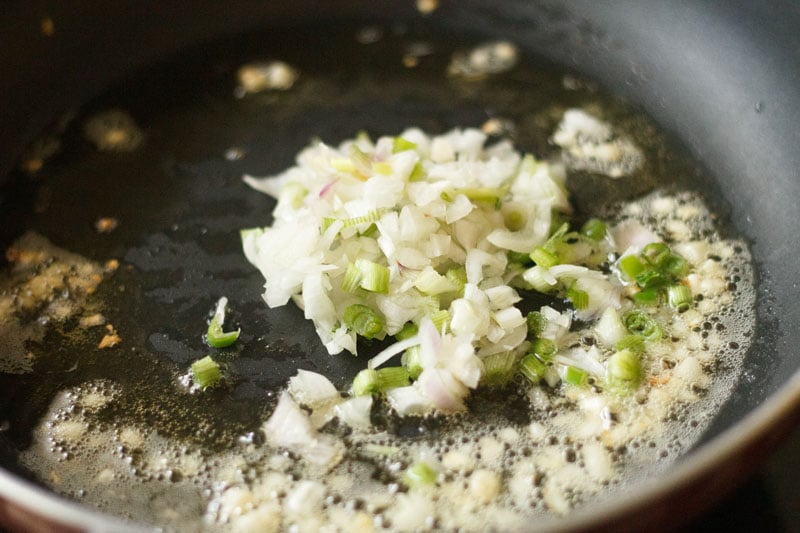
12. The add ¼ cup of finely chopped french beans.
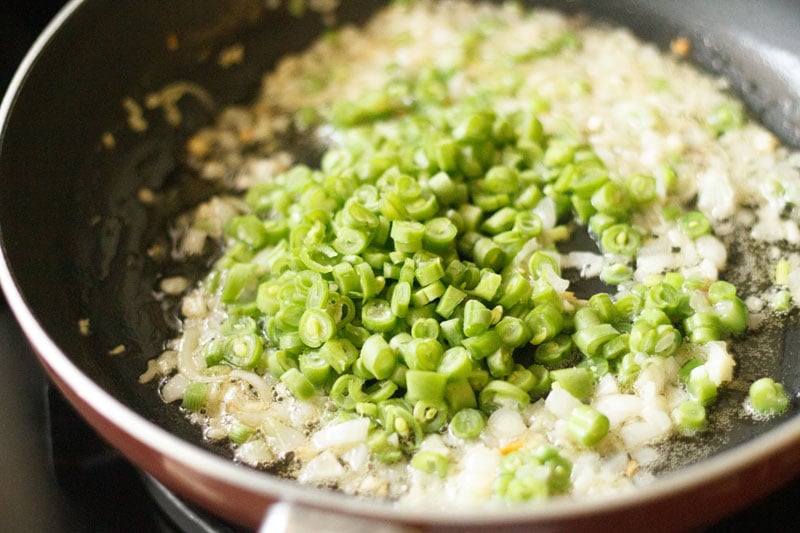
13. Keep stir-frying, stirring continuously, on a medium to high heat for about 3 to 4 minutes.
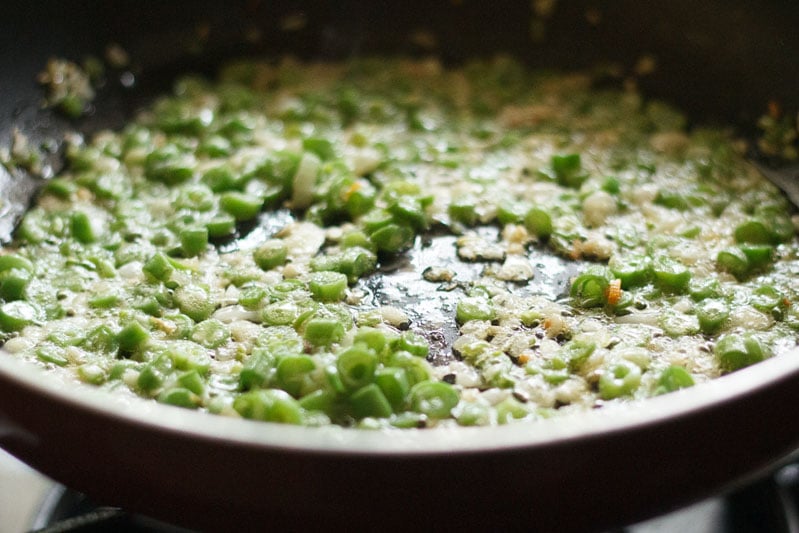
14. Now add the remaining veggies:
- ¼ cup finely chopped carrots
- ¼ cup of capsicum (green bell pepper)
- ½ cup of finely chopped cabbage
- 1 cup chopped or sliced mushrooms.
You can also add zucchini, Chinese cabbage, or whatever vegetables you have on hand. You want about 1 ½ to 2 cups of veggies total for this recipe.
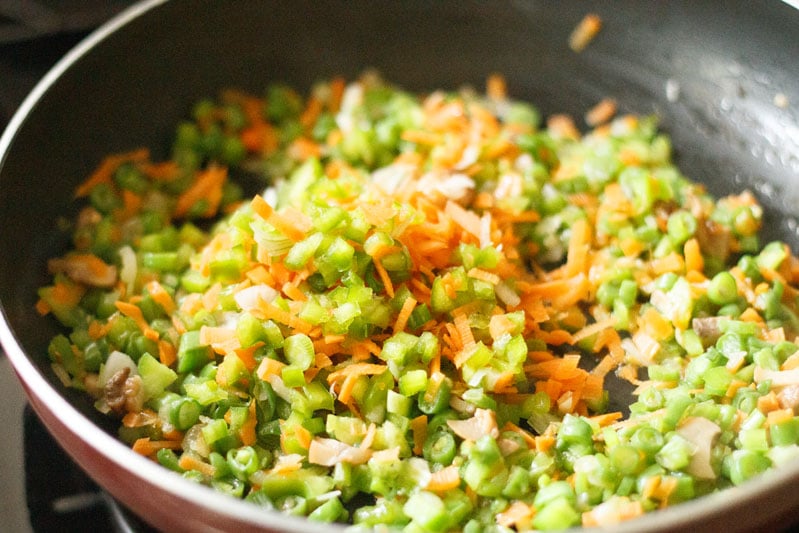
15. Continue to stir fry the veggies on a medium to high heat to get that great smoky flavor. Make sure you stir constantly so that the vegetables brown evenly without burning.
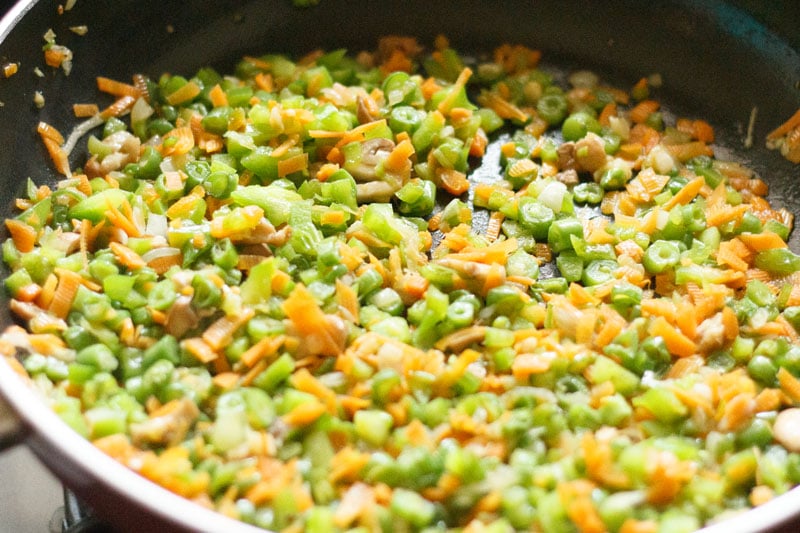
16. Cook for about 7 to 8 minutes (time will vary with the kind of pan and intensity of flame or heat), until the edges of the veggies start to slightly brown. Depending on how crunchy or soft you like your vegetables, feel free to stir fry for more or less time.
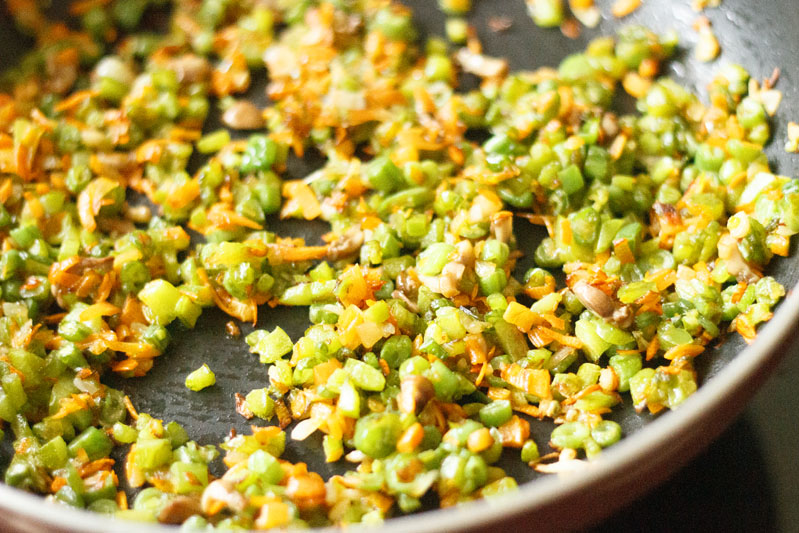
17. Now reduce the heat to medium and add 1 tablespoon of homemade or store bought Schezwan sauce, salt and ¼ to ½ teaspoon black pepper.
TIP: Add more of the sauce for an even spicier noodle dish.
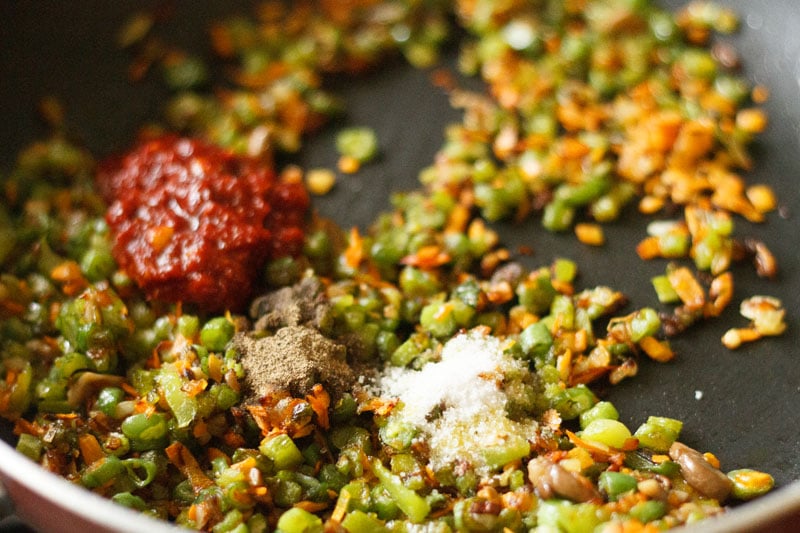
Making Schezwan Noodles
18. Add the cooked noodles one handful at a time, stirring gently to incorporate without mushing the noodles.
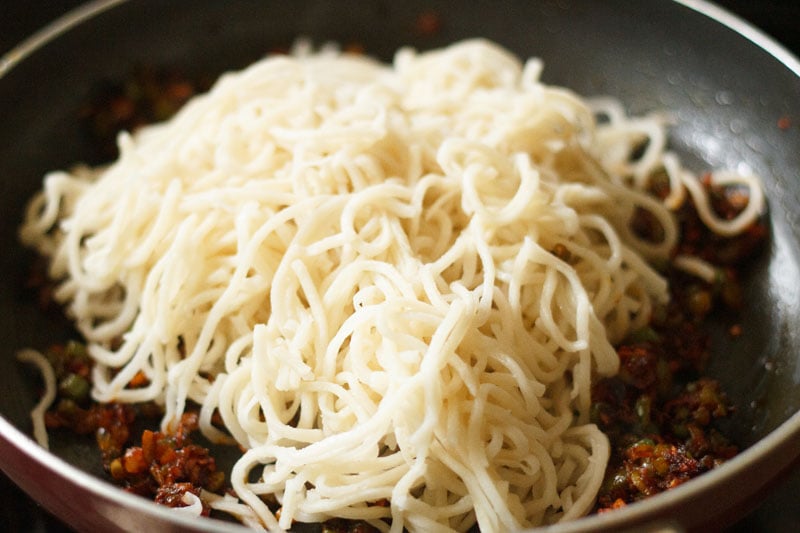
19. Increase the flame back up to high, and continue to stir fry and toss the noodles for a couple of minutes until the Schezwan sauce coats all of the noodles.
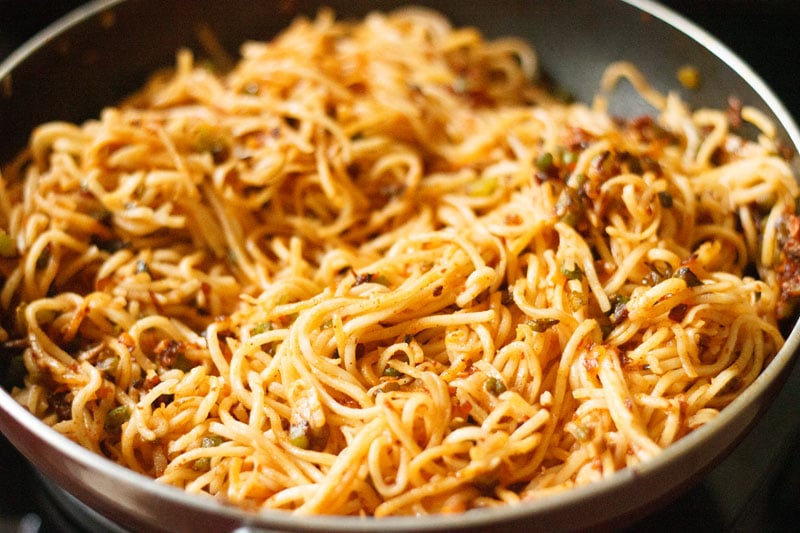
20. Add 1 teaspoon of either rice vinegar or apple cider vinegar, and toss again. This hit of tangy flavor really brings together the spiciness and sweetness of the Schezwan noodles with veggies.
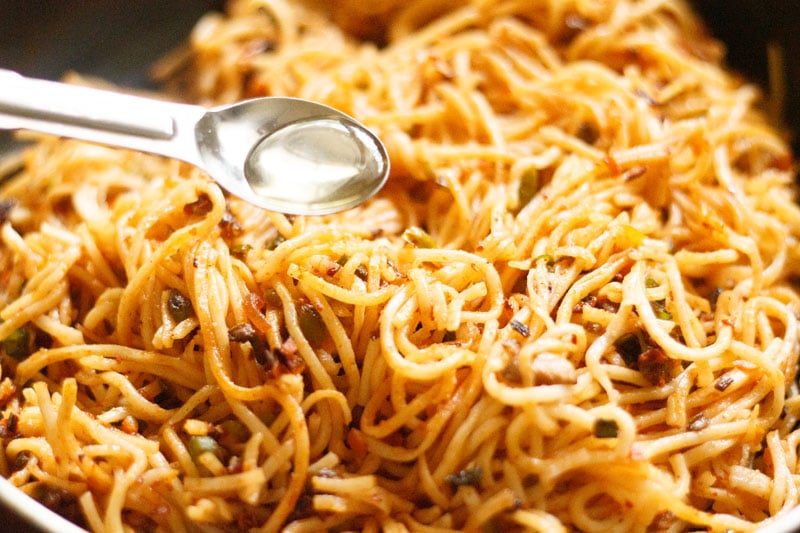
21. Lastly, stir in a tablespoon of chopped spring onion greens.
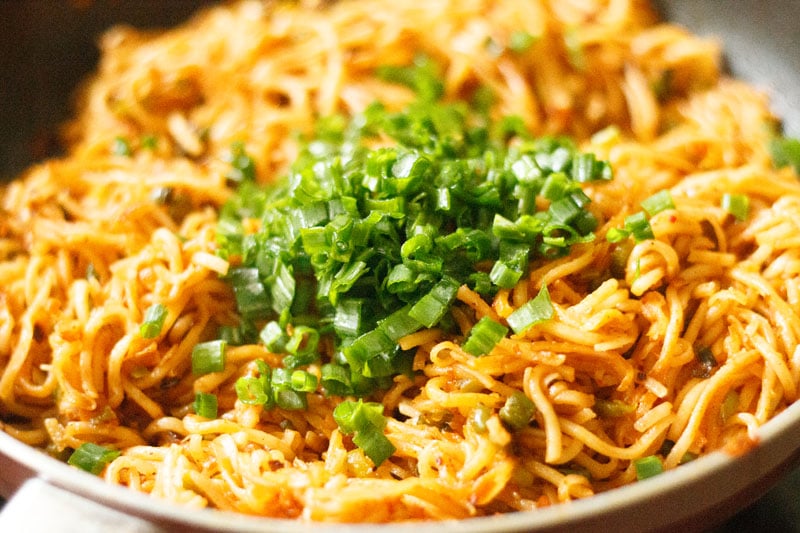
Serving and Storage Suggestions
22. Enjoy schezwan noodles hot in bowls or on plates. You can also serve extra Schezwan sauce on the side for people who want to add even more heat.
Store cooled leftovers in an airtight container, and keep in the refrigerator for up to 1 to 2 days. You can even easily double or triple the batch to make for small parties or get togethers.
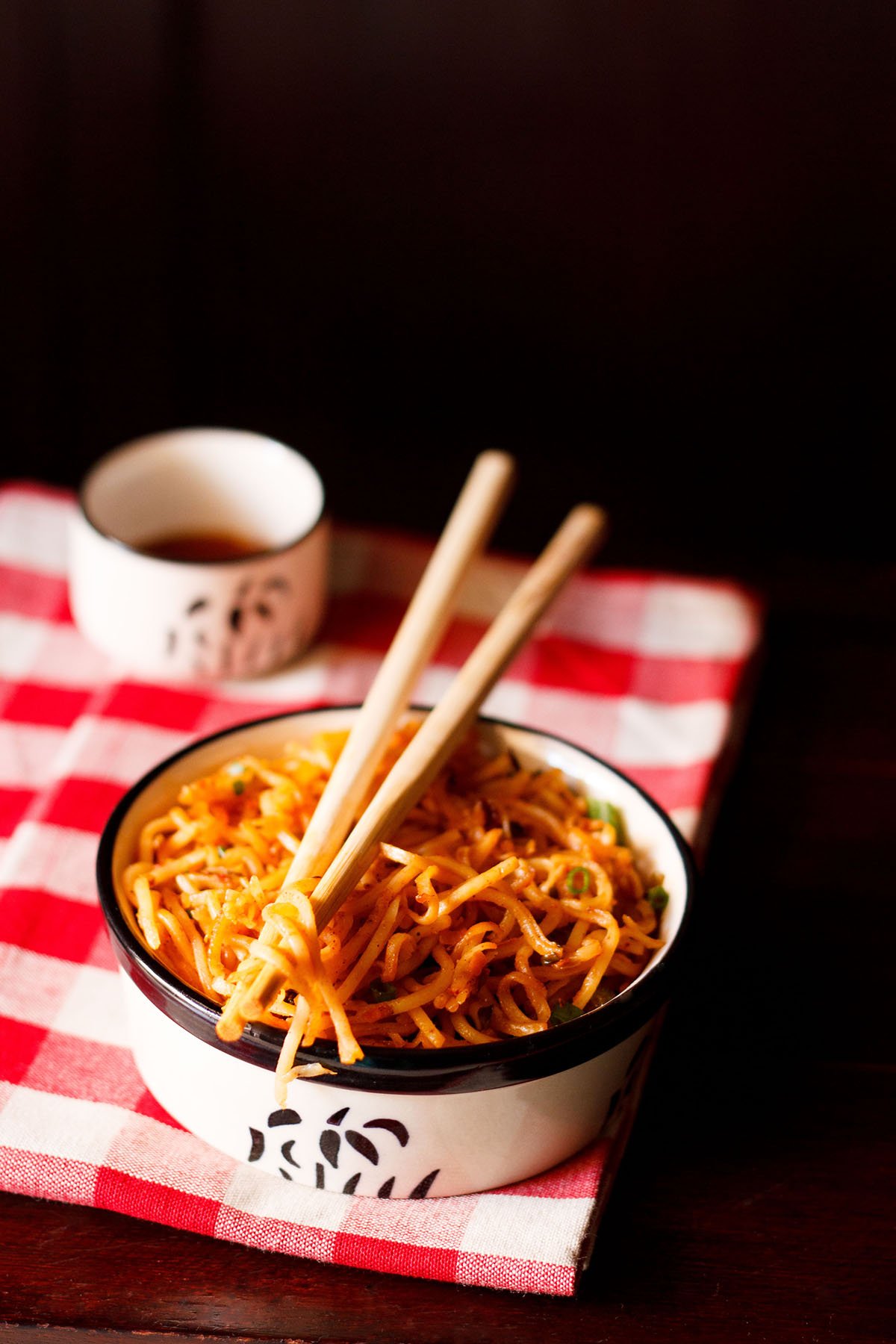
Expert Tips
Ingredient Variations
- Noodles: Any kind of flour noodles work well here – be it instant, ramen, udon, hakka, whole wheat, chow mein, soba (buckwheat) or rice noodles. You can also make the recipe with flat flour or rice noodles.
- Veggies: Like with any recipe which has mix veggies, you can always change the kind or type of vegetables you add in. Zucchini, carrots, green beans, asparagus, bok choy, chinese cabbage, broccoli, bell pepper, baby corn, steamed corn or green peas and mushrooms like button, cremini, oyster and shiitake are some great options.
- Protein: For an added plant based protein, include some tofu or seitan. You can also add some boiled edamame beans or green peas.
- Schezwan sauce: Either make your own or use your favorite brand of schezwan sauce. Being a star ingredient in the recipe, the schezwan sauce can make or break your dish.
Cooking Notes
- Smoky flavors: To get the smoky flavor, stir fry the veggies on a high heat. If the veggies start to getting burnt, then you can reduce the heat. If you use a good wok or pan with a heavy base, you won’t have the vegetables getting burnt. Make sure to stir often while frying which ensures that the vegetables are browned evenly.
- Pan or wok: A carbon steel wok or a Chinese wok is the best to work with when making stir fried recipes. A frying pan or a cast iron skillet or wok is also a good option. Whichever wok or pan you use, make sure it is well seasoned and is heavy or has a thick bottom, so that the vegetables do not burn when stir frying at a high heat.
- Cooking noodles: You need to cook the noodles al dente meaning they should have a slight bite to them when eaten. If you make them soft, later on stir frying they will cook more and end up becoming sticky or lumpy. Drain the water thoroughly from the noodles after cooking them so that they do not become a mush while stir frying.
FAQs
Both are stir-fried noodles from the fusion Indian Chinese cuisine. Schezwan noodles recipe is made with the spicy schezwan sauce and Hakka Noodles is made with soy sauce. Hakka Noodles is more like your simple stir-fried noodles that is not spicy or pungent, while schezwan noodles is spicy.
Yes you can do that. A slight tang or sourness will be missing, but you can sub lemon juice in place of vinegar if you prefer.
Yes of course, you can add about 1 to 2 teaspoons of soy sauce.
If your stir fried schezwan noodles, look sticky or mushy, it means that you have either cooked them too much or you have not strained them well of the water or you have added hot noodles while stir frying.
Few More Favorite Noodles Recipes!
Indo Chinese Recipes
Indo Chinese Recipes
World Recipes
Indo Chinese Recipes
Please be sure to rate the recipe in the recipe card or leave a comment below if you have made it. For more vegetarian inspirations, Sign Up for my emails or follow me on Instagram, Youtube, Facebook, Pinterest or Twitter.
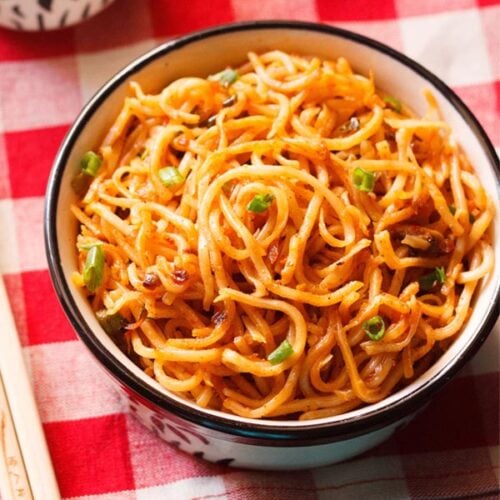
Schezwan Noodles Recipe
Ingredients
For cooking noodles
- 150 grams noodles hakka, instant or chow mein noodles
- 1 to 2 pinches salt or as required
- 4 cups water – to cook noodles
- 2 to 3 drops oil – to be added while heating water
- 1 to 2 teaspoons oil – to coat the noodles
Other ingredients
- 2 tablespoons oil – for stir frying
- ¼ cup chopped spring onion whites (scallion whites) – reserve the greens for garnish
- ½ teaspoon finely chopped garlic or 2 to 3 small to medium garlic cloves
- ¼ cup finely chopped french beans
- ¼ cup finely chopped bell pepper
- ¼ cup finely chopped carrots
- ½ cup finely chopped cabbage
- 1 cup sliced button mushrooms
- 1 tablespoon Schezwan Sauce or as required
- ¼ to ½ teaspoon black pepper powder or as required
- salt as required
- 1 teaspoon rice vinegar or apple cider vinegar or white vinegar
- 1 to 1.5 tablespoons spring onion greens (scallion greens)
Instructions
Cooking noodles
- Boil 4 cups of water in a pot or pan with a pinch of salt for flavor, and a few drops of oil to keep the noodles from sticking together.
- Add the noodles in the hot boiling water.
- Cook the noodles according to the package instructions.
- When the noodles are just about cooked, meaning al dente, then strain the noodles in a colander.
- Rinse the noodles in fresh water. This stops their cooking process and removes the starch.
- Add oil to noodles. Toss the noodles gently, so that the oil coats the noodles evenly. This helps to get rid of stickiness from the noodles.
- Cover the colander with a plate and set aside. Let the noodles cool completely before you add them to the stir fried veggies.
Stir frying veggies
- Heat oil in a pan or wok. On medium heat, add the garlic and saute for a few seconds.
- Increase the heat and then add the finely chopped spring onion whites (scallion whites). Stir fry on a medium to high heat for about half to 1 minute. For a nonstick pan, stir fry at medium heat.
- Add the french beans. Keep stir frying, stirring often on medium to high heat for about 3 to 4 minutes. For a nonstick pan, stir fry at medium heat.
- Add the remaining veggies – finely chopped carrots, capsicum (green bell pepper), cabbage and mushrooms. Continue to stir fry the veggies on medium to high heat stirring often.
- Stir fry for about 7 to 8 minutes until the edges of the veggies start to slightly brown. You can cut down on the stir frying time, if you prefer half cooked or more crunchy veggies.
Making schezwan noodles
- Now reduce the flame to medium heat and add schezwan sauce, salt and black pepper.
- Add the cooked noodles in batches. Toss, mix and stir fry.
- Increase the heat and keep on tossing and stir frying the noodles for a couple of minutes until the schezwan sauce coats the noodles evenly.
- Add rice vinegar or apple cider vinegar and mix well. Check the seasonings and add more schezwan sauce, black pepper and salt if needed.
- Add the chopped spring onions to schezwan noodles. Mix.
- Serve schezwan noodles.
Serving and storage suggestions
- Enjoy eating schezwan noodles hot or warm. You can also serve extra Schezwan sauce on the side for people who want to add even more heat.
- Store cooled leftovers in an airtight container, and keep in the refrigerator for up to 1 to 2 days. You can even easily double or triple the batch to make for small parties or get togethers.
Video
Notes
Ingredient Variations
- Noodles: You can make schezwan noodles with type of noodles – instant, ramen, udon, hakka, whole wheat, chow mein, soba (buckwheat) or rice noodles. You can also make the recipe with flat flour or rice noodles.
- Veggies: In the recipe you can always include any kind or type of vegetables. Zucchini, carrots, green beans, asparagus, bok choy, chinese cabbage, broccoli, bell pepper, baby corn, steamed corn or green peas and mushrooms like button, cremini, oyster and shiitake are some great options.
- Protein: For an added plant based protein, add some tofu or seitan. You can also add some boiled edamame beans or green peas.
- Schezwan sauce: Either make your own or use your favorite brand of schezwan sauce. Being a star ingredient in the recipe, the schezwan sauce can make or break your dish.
Cooking Notes
- Smoky flavors: To get the smoky flavor, stir fry the veggies on a high heat. If the veggies start to getting burnt, then you can reduce the heat. If you use a good wok or pan with a heavy base, you won’t have the vegetables getting burnt. Make sure to stir often while frying which ensures that the vegetables are browned evenly. For a non-stick pan, stir fry on medium heat.
- Pan or wok: A carbon steel wok or a Chinese wok is the best to work with when making stir fried recipes. A frying pan or a cast iron skillet or wok is also a good option. Whichever wok or pan you use, make sure it is well seasoned and is heavy or has a thick bottom, so that the vegetables do not burn when stir frying at a high heat.
- Cooking noodles: You need to cook the noodles al dente meaning they should have a slight bite to them when eaten. If you make them soft, later on stir frying they will cook more and end up becoming sticky or lumpy. Drain the water thoroughly from the noodles after cooking them so that they do not become a mush while stir frying.
- Sticky noodles: If your stir fried schezwan noodles, look sticky or mushy, it means that you have either cooked them too much or you have not strained them well or you have added hot noodles while making the dish.
Nutrition Info (Approximate Values)
This schezwan noodles recipe post from the blog archives (July 2014) has been republished and updated on 13 February 2021.
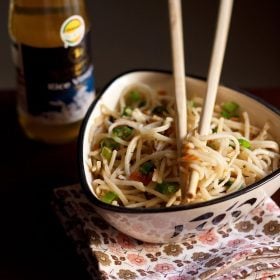
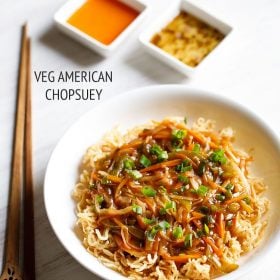
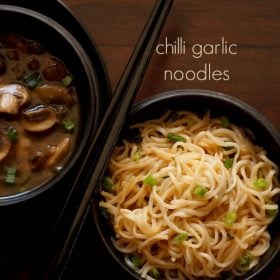
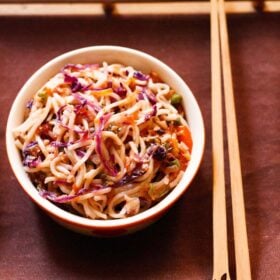
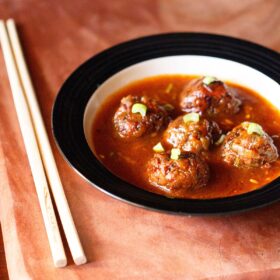
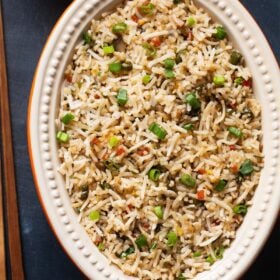
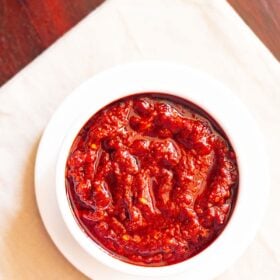









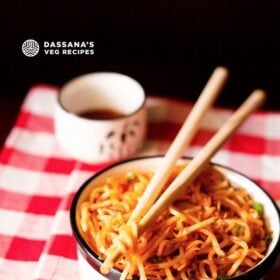
I added stir fried chicken and garlic salt instead of salt and voila…..super hit !!! Thank you.
welcome sabina
I made schezwan noodles but the colour was different (very slightly orange) than yours. I also added 1 teaspoon extra but it didn’t helped me.
nikhil, the color largely depends on the variety and type of red chilies used. some red chilies like kashmiri red chilies or byadagi red chilies give a nice deep reddish or reddish orange color. as long as the taste is good, color should not make much of a difference if making for family or friends.